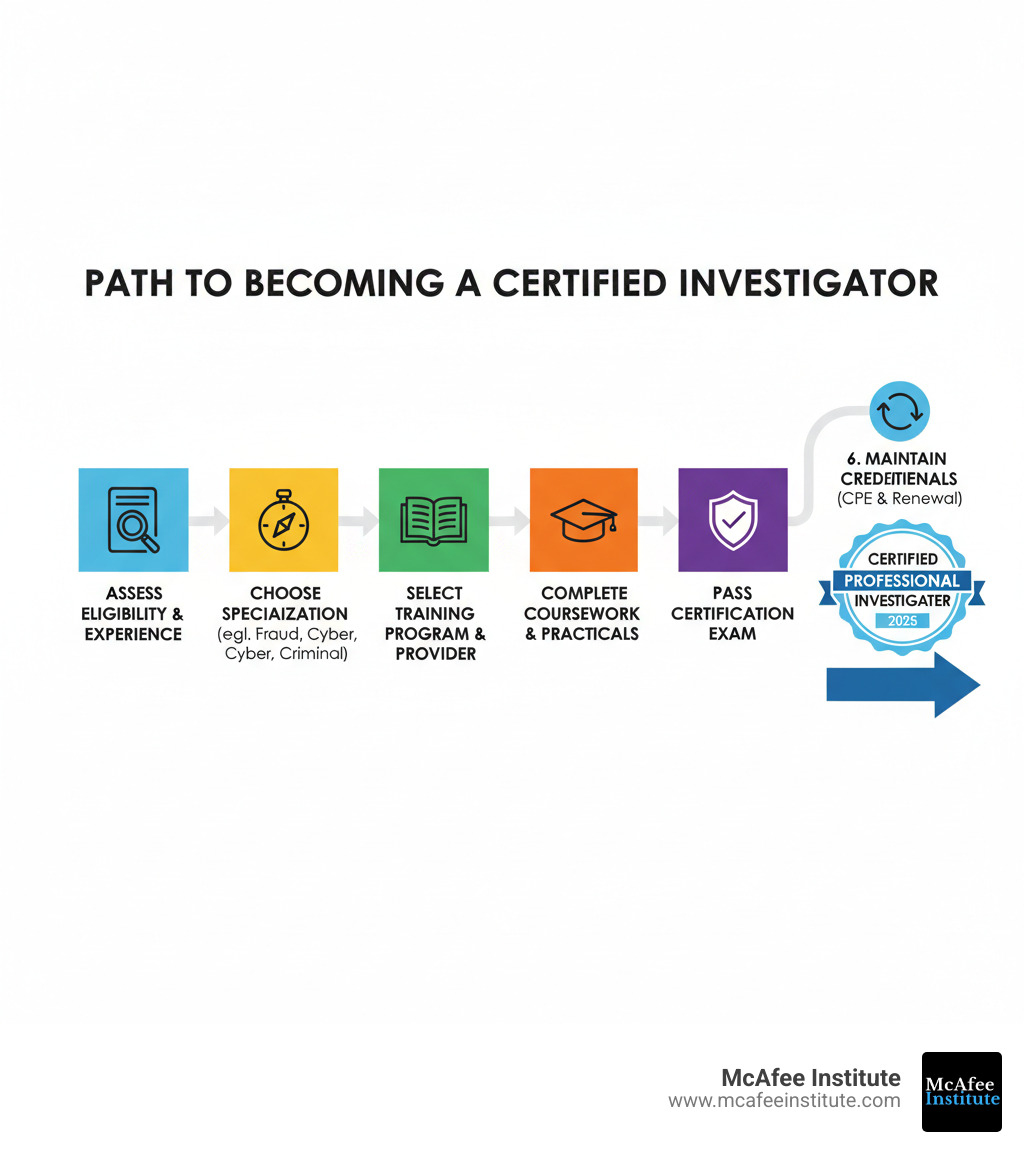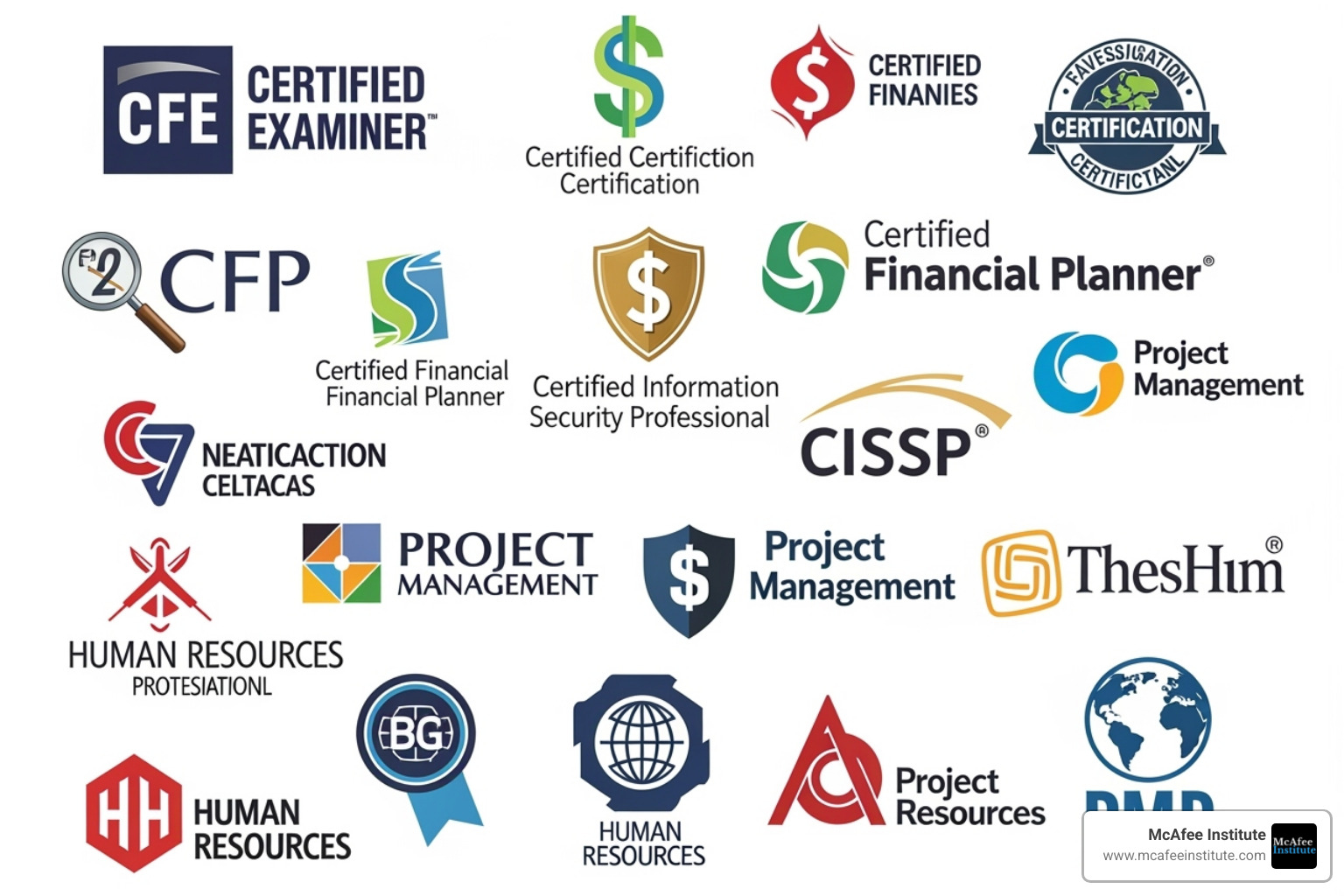Why Professional Certified Investigator Training is Essential for Career Success
Professional certified investigator training provides the specialized skills, industry recognition, and credibility needed to advance in law enforcement, intelligence, and investigative roles. Whether you aim to move into case management, specialize in fraud or cyber investigations, or stand out in a competitive job market, certification validates your expertise and opens doors to promotions, federal recognition, and higher earning potential.
Quick Answer: Finding the Right Professional Certified Investigator Training
- Identify your specialization - criminal investigations, fraud, regulatory compliance, or cybercrime
- Choose a recognized certification - such as those offered by ASIS, McAfee Institute, ACFE, or CLEAR
- Verify accreditation - ensure government or industry body recognition
- Select your learning path - online self-paced, live virtual, or in-person intensive training
- Check eligibility requirements - typically 3-5 years of experience plus background checks
- Budget for the investment - training costs range from $500-$4,500, plus exam and renewal fees
The investigative profession has evolved. Today’s investigators must master cyber investigations, digital forensics, and threat assessment alongside core skills like surveillance and interviewing. Over 22,000 professionals have already advanced their careers through specialized training, demonstrating that credentials are career transformers.
Many mid-career professionals hit a plateau, where experience alone isn't enough to secure promotions. The challenge isn't capability; it's proving it with credentials that decision-makers trust. I'm Joshua McAfee, and at McAfee Institute, we've empowered over 150,000 professionals worldwide with government-recognized professional certified investigator training. I know that the right certification can change everything.

Why a Professional Investigator Certification is Your Key to Career Advancement
Let's be honest: experience alone doesn't always open the doors you deserve. In today's investigative profession, the certified candidate often gets the promotion, which is why professional certified investigator training and certification are so critical.
Think of certification as the difference between telling someone you're good at your job and proving it. Earning a recognized credential shows that an independent, authoritative body has validated your expertise in investigative techniques, case management, and evidence presentation. In fields like law enforcement and corporate security—where trust is everything—this credibility boost is crucial.
The competitive edge is undeniable. Employers actively seek certified professionals because they represent a higher standard of training and proven capability. McAfee Institute is ranked No. 1 among all training and certification providers for intelligence and investigation education according to NICCS, reflecting the trust that top organizations and government agencies place in certified professionals.
Furthermore, independently validated skills command higher salaries, offering a direct return on your investment. Beyond the practical benefits, certification provides industry recognition, signaling to peers and supervisors that you are committed to excellence and continuous professional development.
The numbers speak for themselves. Over 22,000 professionals have advanced their careers through programs like the National Certified Investigator and Inspector Training (NCIT), demonstrating tangible, real-world benefits. These are investigators who've earned promotions, secured federal recognition, and opened up opportunities that were previously out of reach.

Navigating the World of Investigator Certifications
The landscape of professional certified investigator training can feel overwhelming, but it becomes clearer when you match your career goals to the right specialization. Whether you're drawn to corporate security, financial fraud, or cybercrime, choosing the right certification path is key.
Let's explore the major certification pathways.
General & Security Investigations
For those in corporate security or general investigative roles, the ASIS International Professional Certified Investigator (PCI) is a widely recognized credential. It focuses on comprehensive investigative techniques, case management, and presentation skills, designed for seasoned professionals with several years of experience.
Criminal & Law Enforcement Investigations
Criminal investigations demand skills to build cases that withstand prosecution. Our Qualified Professional Criminal Investigator (Q|PCI) program at McAfee Institute was built for these high-stakes scenarios. The Q|PCI provides in-depth training in cyber investigations, fraud schemes, terrorism, and human behavior analysis. It is designed to be the most comprehensive criminal investigation training available, equipping you to lead complex investigations in an evolving criminal landscape.
How AI is Transforming the Future of Investigations
Fraud & Financial Investigations
Financial investigations require a unique blend of accounting, legal, and investigative skills. The Association of Certified Fraud Examiners (ACFE) offers the globally respected Certified Fraud Examiner (CFE) credential. CFE training covers tracing financial transactions, identifying fraud schemes, and understanding the legal elements of fraud, which is essential for anyone dealing with financial irregularities.
Regulatory & Compliance Investigations
Government agencies and regulatory bodies need investigators to ensure compliance with industry standards and licensing requirements. The National Certified Investigator and Inspector Training (NCIT) programs, offered by organizations like CLEAR, have long been the standard for regulatory investigation. These programs focus on evidence collection, interviewing, and report writing within regulatory frameworks.
Specialized & Niche Certifications
The investigative field is evolving, with specialized certifications emerging for high-demand areas. These niche credentials allow you to develop deep expertise.
- Open Source Intelligence (OSINT) teaches you to legally gather information from public sources like social media and public records (see the OSINT overview on Wikipedia).
- Cybercrime and Digital Forensics provide skills to analyze digital devices, trace network intrusions, and collect electronic evidence (learn the basics of digital forensics).
- Human Trafficking Investigations require specialized, victim-centric approaches and trauma-informed interviewing techniques.
These specializations are career differentiators. As we explore in 10 Reasons Why OSINT Certifications Are Essential for Your Career, they provide the targeted expertise needed to tackle modern challenges. The right certification depends on your career goals; choose a path that aligns with your professional trajectory.

The Path to Certification: Your Step-by-Step Guide to Professional Certified Investigator Training
Starting on professional certified investigator training is a strategic career move that follows a general roadmap, leading you toward a credential that can transform your professional trajectory.

Understanding Eligibility: Do You Qualify?
Before diving into training, verify that you meet the eligibility requirements. Certification bodies set these standards to ensure all credential holders have a solid foundation of experience and integrity.
- Experience: Most professional certifications require several years of investigative work. For example, our Q|PCI program requires a combination of education and experience, such as a Bachelor's degree plus two years of experience, or a high school diploma with four years in a relevant role.
- Education: While some certifications prefer a degree, many accept a combination of education and hands-on experience.
- Character: Background checks are standard. You must confirm you have no disqualifying criminal convictions to uphold the integrity of the profession.
Training Programs vs. Certification Exams: What's the Difference?
It's important to understand the distinction between training and exams.
- Training programs are for skill development. They provide a structured curriculum, practical exercises, and expert instruction to build your investigative toolkit. Our Q|PCI program, for instance, uses video tutorials and real-life scenarios to help you master techniques.
- Certification exams are for skill validation. They are typically timed, multiple-choice tests that assess your knowledge and ability to apply what you've learned. Passing the exam is your professional stamp of approval.
Training teaches you how to do the job, while exams validate that you can.
Choosing Your Learning Path: Online vs. In-Person Professional Certified Investigator Training
Modern training offers flexible pathways to suit any lifestyle.
- Online Learning: This has become the standard for busy professionals. Programs like our Q|PCI are 100% online and self-paced, offering 24/7 access to materials. This flexibility is essential for balancing a career, family, and professional development.
- In-Person Training: Classroom settings offer direct interaction with instructors and peers, which is valuable for networking and hands-on skills practice.
- Live Virtual Sessions: This hybrid model provides real-time instruction online, combining the engagement of a classroom with the convenience of remote access.
At McAfee Institute, our programs are globally accessible because talent isn't confined to one location. Our commitment to lifetime access means you can revisit materials and receive free updates for life, ensuring your skills remain current.
What to Expect: Core Skills and Knowledge in Investigator Programs
When you enroll in professional certified investigator training, you are building real-world competencies. The best programs blend foundational skills with cutting-edge techniques grounded in practical scenarios.

Foundational Investigative Skills
Every great investigator first masters the fundamentals that separate professionals from amateurs.
- Case Management: Learn to organize investigations, track leads, manage evidence, and operate within legal and ethical boundaries.
- Interview and Interrogation: Develop the art of asking the right questions, reading verbal and nonverbal cues, and detecting deception.
- Surveillance Techniques: Master methods for mobile and on-foot tracking, as well as covert monitoring.
- Evidence Collection and Handling: Understand the proper procedures for identifying, collecting, and preserving evidence to ensure it is admissible in court.
- Legal and Ethical Principles: Training in criminal law and professional standards is crucial for maintaining credibility and integrity.
- Report Writing: A brilliant investigation is useless without a clear, concise, and accurate report. Learn how to document your findings effectively in our guide: How to Write an Investigation Report: A Step-by-Step Guide.
Mastering Modern Investigative Techniques
If your training doesn't include modern digital techniques, you're learning to investigate in a world that no longer exists.
- Open-Source Intelligence (OSINT): This has revolutionized investigations by leveraging publicly available information. Learn more in our Understanding OSINT: A Comprehensive Guide.
- Digital Forensics: Analyzing digital devices to recover electronic data is now fundamental to nearly every case.
- Cybercrime Investigation: Track cybercriminals, understand attack vectors, and secure digital evidence across platforms.
- Artificial Intelligence (AI): AI tools can analyze massive datasets and identify patterns humans might miss. Understanding how to use them ethically is becoming a must-have skill. See how AI is Transforming the Future of Investigations.
Our Q|PCI program is designed to ensure you are equipped for these contemporary challenges, with practical training that transforms good investigators into exceptional ones. Check out 5 Incredible OSINT Techniques to Supercharge Your Investigations in 2025.
The Investment in Your Future: Costs, Renewals, and Oversight
Investing in professional certified investigator training is an investment in your future that requires financial planning and a commitment to lifelong learning.
Breaking Down the Costs of Professional Certified Investigator Training
Costs vary by program depth and provider. It's essential to budget for all potential expenses:
- Tuition Fees: The primary cost for the training program itself.
- Exam Fees: A separate fee to take the certification exam.
- Study Materials: Textbooks, practice exams, and study guides.
- Renewal Fees: Most certifications require periodic renewal, but some providers offer a different model.
- Travel and Accommodation: For any in-person training or exams.
| Item | Estimated Cost Range (USD) | Notes |
|---|---|---|
| Training (Tuition) | $500 - $4,500+ | Varies by program, duration, and provider. Our McAfee Institute training programs generally offer lifetime access, meaning you pay once for the training content. |
| Exam License | $450+ | Separate fee for the certification exam itself. |
| Study Guides | $50 - $300+ | Reference materials, practice tests, flashcards. |
| Renewal Fees | $100 - $250 (per cycle) | Typically every 2-3 years. Our McAfee Institute certifications generally do not have annual renewal fees for the certification itself, aligning with our lifetime access model. |
Maintaining Your Credentials: Renewal Requirements & CPEs
Obtaining a certification is just the beginning. Most require periodic renewal, typically every two to three years, which involves earning Continuing Professional Education (CPE) credits. This ensures you stay current with industry trends, new techniques, and evolving legal frameworks. Our commitment at McAfee Institute includes lifetime access to our training and free updates, helping our certified professionals meet ongoing learning requirements without recurring tuition costs.
The Role of Professional Associations and Accrediting Bodies
Accrediting bodies play a critical role in upholding the integrity of investigator certifications. They set eligibility criteria, define the body of knowledge, and ensure the relevance of the certification. Accreditation is a formal recognition that a program meets quality standards. Our McAfee Institute certifications are accredited by multiple U.S. government agencies and educational bodies, and we are recognized by NICCS as a top provider. This government recognition and employer trust are what make a certification truly valuable.

Frequently Asked Questions about Professional Investigator Certifications
We hear from investigators every day who are ready to advance their careers but are unsure where to start. Here are answers to the most common questions.
How long does it take to get a professional investigator certification?
The honest answer is: it varies. The training component can take anywhere from a few weeks to several months, depending on the program's depth and your learning pace. Many programs, including ours at McAfee Institute, are self-paced, giving you control over your schedule.
However, the biggest time factor is often the experience requirement. Most credible certifications require several years of investigative experience before you can even sit for the exam. For example, our CPCI program has prerequisites combining education and work experience. This ensures that certified professionals are not just book-smart but have real-world judgment.
Is a certification the same as a private investigator license?
This is a critical distinction.
- A private investigator license is a legal requirement from a government body to operate as a PI in a specific jurisdiction. It grants you the legal right to work.
- A professional investigator certification is a voluntary credential from a professional organization that demonstrates expertise and specialized knowledge.
While a license is essential to practice legally, a certification proves you are skilled, trained, and committed to professional excellence. Our government-recognized certifications at McAfee Institute carry weight with employers and are the difference between meeting the minimum requirement and standing out as a true professional.
What is the best certification for a new investigator?
The answer depends on your career goals.
- If you're genuinely new to the field, start with training that builds foundational skills in areas like surveillance and report writing. This helps bridge the gap between basic licensing and what employers actually need.
- If you have some foundational experience from a related field like law enforcement, you may be ready for advanced credentials like the ASIS Professional Certified Investigator (PCI) or our McAfee Institute Certified Professional Criminal Investigator (CPCI). The Q|PCI is the industry's premier training for criminal investigations, designed to turn experienced investigators into leading experts.
- For those aspiring to specific specializations, consider certifications that align with your target role, such as digital forensics or OSINT.
The key is to identify your desired specialization first, then seek out government-recognized and employer-trusted training—like those we offer at McAfee Institute—that provides a clear path to career growth.
Conclusion: Take the Next Step in Your Investigative Career
You've reached the end of this guide, but your journey is just beginning. We've explored the landscape of professional certified investigator training, and the conclusion is clear: in today's evolving field, experience alone is not enough. Certification bridges the gap, validating that you are current, competent, and committed to excellence.
But not all certifications are created equal. The value of your credential depends on its recognition and the quality of the training. Is it trusted by government agencies and employers? Is the content relevant to real-world challenges?
We built McAfee Institute to answer "yes" to those questions. Our programs are government-recognized and employer-trusted, and we are ranked No. 1 by NICCS for intelligence and investigation education. What truly sets us apart is our commitment to your career:
- Lifetime access to all training materials.
- No annual renewal fees for our certifications.
- Free updates for life to keep your skills current.
- Live instructor support when you need it.
Over 150,000 professionals have chosen our programs to earn promotions, gain federal recognition, and build high-impact careers. They started where you are now—looking for the right path forward.
Take the next step. Explore our comprehensive programs, from the Certified Professional Criminal Investigator (CPCI) to specialized certifications in OSINT and digital forensics. Join the ranks of certified professionals leading the field. Your future as a recognized investigator starts now.
The Ultimate Guide to McAfee Institute Courses, Reviews, More






Member discussion